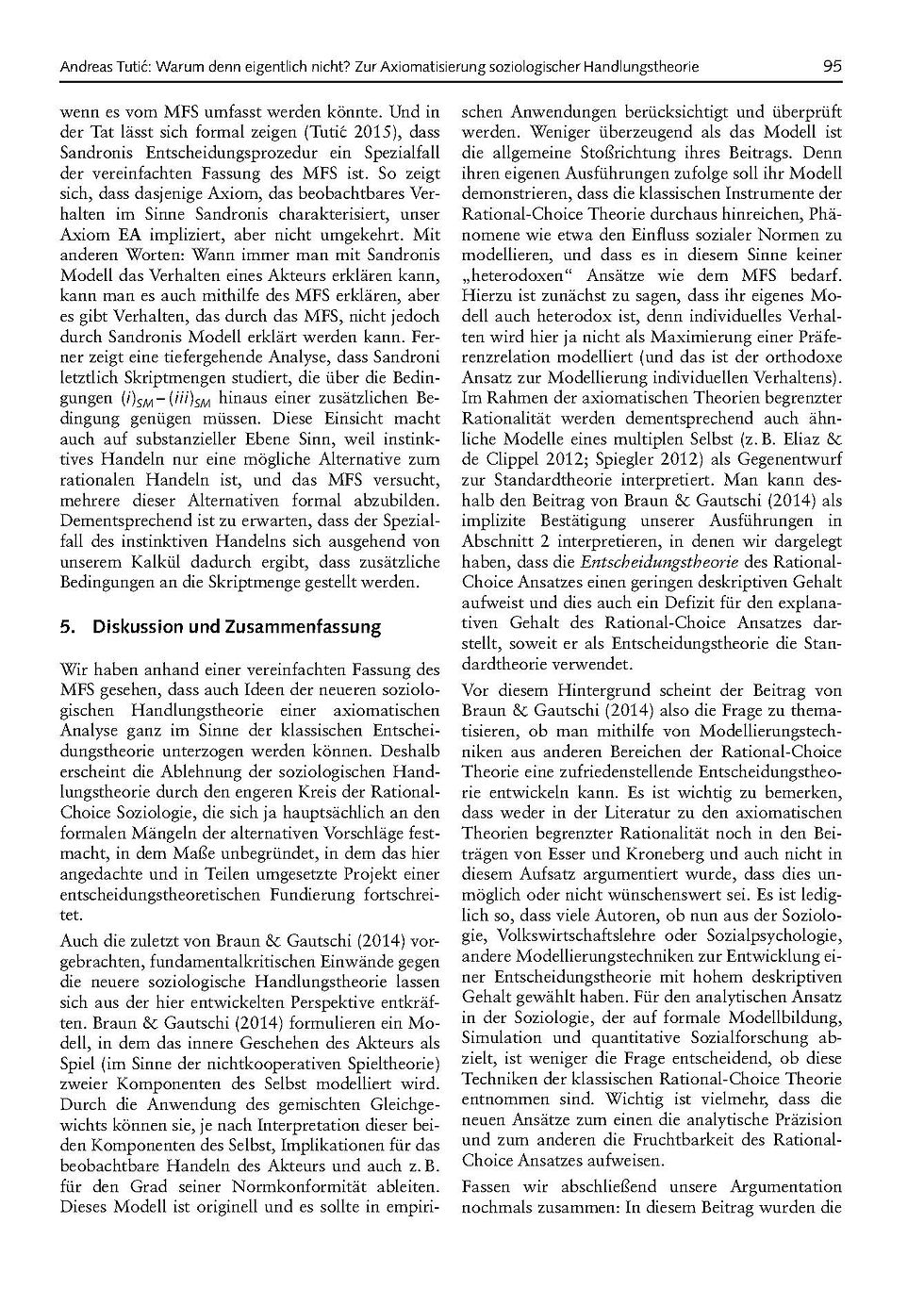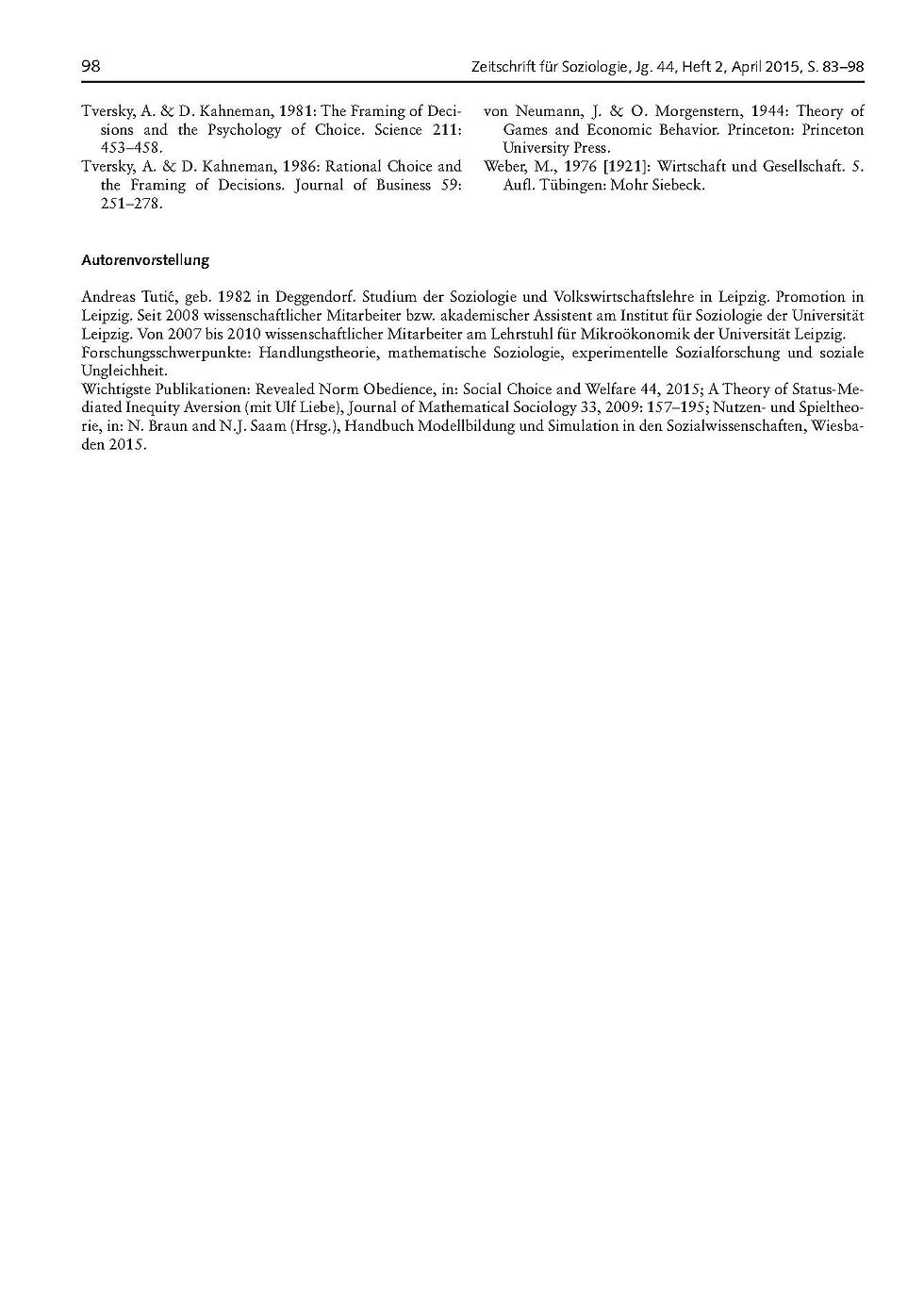Key Publications
































Paper |01
Why not? On Axiomatizing Sociological Action Theory
We demonstrate that two different approaches to decision theory, i.e. the axiomatic theories of bounded rationality and the new sociological theory of action, share the common goal of developing a decision theory that actually describes what happens inside the minds of decision makers. Additionally, we argue that sociological action theory needs to adopt the axiomatic method. We illustrate this method by providing a partial characterization of the model of frame selection (Esser 2001; Kroneberg 2005), which is probably the most influential model in new sociological action theory.








































Paper |02
Status Characteristics and the Provision of Public Goods: Experimental Evidence
We present experimental evidence on the effects of status characteristics in problems involving the provision of public goods. According to Status Characteristics Theory (SCT), status differentials affect performance expectations, which in turn affect the power and prestige order in group tasks. Applied to problems of collective action, SCT suggests several intriguing hypotheses (cf. Simpson, Willer, and Ridgeway 2012). Most importantly, the theory proposes that high-status actors show a greater initiative in and also overall contribute more to the provision of public goods than low-status actors. We put this theoretical claim to a strict experimental test, in addition to other hypotheses and conjectures. In our experimental setup, the volunteer’s timing dilemma is used as the group task. Three experimental conditions are implemented, which differ with respect to the way status groups are formed on basis of the type of status characteristic. Our results validate the central hypothesis cited above and also lend support to a conjecture regarding the beneficial effects
of heterogeneity in status.


























Paper |03
Reconstructing Granovetter's Network Theory
We employ concepts from graph theory and cooperative game theory to reconstruct Granovetter's famous thesis concerning "the strength of weak ties". In contrast to existing formal models related to this thesis, our approach captures the mechanisms Granovetter invokes in the derivation of his thesis. Notably, our model allows for an analytical distinction between the strength of ties and the value of ties - a distinction empirical research on the labor market has shown to be of great importance. We use our model to test the theoretical validity of Granovetter's thesis and to evaluate its robustness if implicit assumptions in Granovetter's argumentation are dropped.

Book |01
Rational Choice (edited by Andreas Tutić)
Die Rational-Choice-Theorie nimmt in vielerlei Hinsicht — etwa mit Blick auf ihre formalisierte Theoriearchitektur und ihre Fruchtbarkeit in der angewandten Sozialforschung — eine besondere Stellung in den Sozialwissenschaften ein. Zugleich wird der Ansatz gerade in der Soziologie häufig als grundlegend defizitär dargestellt und vor allem für sein implizites Menschenbild kritisiert. Diesem Band liegt das Ziel zugrunde, weitverbreitete Missverständnisse über die Rational-Choice-Theorie aufzuklären. Grundlegend ist dabei der Gedanke, scharf zwischen dem zugrundeliegenden Formalismus und speziellen Anwendungen zu unterscheiden. Neben den methodologischen Grundlagen der Theorie und den Grundzügen des Formalismus werden insbesondere auch zentrale Anwendungsgebiete, in etwa soziale Dilemmata, Vertrauen, kollektives Handeln und soziale Normen, behandelt. Auch auf die tatsächlichen Schwächen der Rational-Choice-Theorie und Möglichkeiten zu ihrer Fortentwicklung wird eingegangen.
Contributors
Thomas Voss, Werner Raub, Catherine Herfeld, Andreas Tutić, Heinrich Nax, Barry Pradelski, Harald Wiese, Sascha Grehl, Wojtek Przepiorka, Johanna Gereke, Heiko Rauhut, Vincenz Frey, Karl-Dieter Opp, Thomas Gautschi, Hartmut Esser, Clemens Kroneberg, Andreas Diekmann.